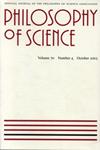论认知上有用的物理计算
IF 1.4
2区 哲学
Q1 HISTORY & PHILOSOPHY OF SCIENCE
引用次数: 0
摘要
Piccinini的可用性约束指出,物理过程必须具有“物理上可构造的表现”,才能包含在物理计算的认知有用模型中。但是要确定哪些物理过程可以在物理系统中实现(作为计算的一部分),我们必须已经知道哪些物理过程可以在物理系统中实现(作为构建计算系统的过程的一部分)。我们需要额外的假设来确定什么是建筑过程。Piccinini隐含地假设了对可执行过程的经典计算理解,但这是一个强加于物理理论的假设,可能人为地限制了我们对认知上有用的物理计算的理解。本文章由计算机程序翻译,如有差异,请以英文原文为准。
On Epistemically Useful Physical Computation
Abstract Piccinini’s usability constraint states that physical processes must have “physically constructible manifestation[s]” to be included in epistemically useful models of physical computation. But to determine what physical processes can be implemented in physical systems (as parts of computations), we must already know what physical processes can be implemented in physical systems (as parts of processes for constructing computing systems). We need additional assumptions about what qualifies as a building process. Piccinini implicitly assumes a classical computational understanding of executable processes, but this is an assumption imposed on physical theories and may artificially limit our picture of epistemically useful physical computation.
求助全文
通过发布文献求助,成功后即可免费获取论文全文。
去求助
来源期刊

Philosophy of Science
管理科学-科学史与科学哲学
CiteScore
3.10
自引率
5.90%
发文量
128
审稿时长
6-12 weeks
期刊介绍:
Since its inception in 1934, Philosophy of Science, along with its sponsoring society, the Philosophy of Science Association, has been dedicated to the furthering of studies and free discussion from diverse standpoints in the philosophy of science. The journal contains essays, discussion articles, and book reviews.
 求助内容:
求助内容: 应助结果提醒方式:
应助结果提醒方式:


